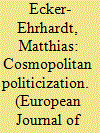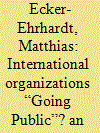| Srl | Item |
| 1 |
ID:
117055


|
|
|
|
|
| Publication |
2012.
|
| Summary/Abstract |
Much of what can be subsumed under the label 'political cosmopolitanism' calls for the empowerment of international institutions because of increased global interdependencies. Surprisingly, however, few scholars have asked whether ordinary citizens share this way of thinking. Do people believe that international institutions are desirable because of their superior capacity to solve transnational problems? To address this question, falsifiable hypotheses about the quality of and scope conditions for a minimally defined 'public political cosmopolitanism' are derived from the literature and tested using the results of a representative survey of German citizens. I show that there is significant support for what I call the 'interdependence model' of cosmopolitan politicization: German citizens' perception of transnational interdependencies (in terms of functional sensitivity as well as moral commitments) fosters beliefs in the capacity of international institutions to solve problems. Remarkably, this relationship is moderated by citizens' sense of their own vulnerability, that is, their beliefs that the national government is incapable of solving such problems. The interdependence model has significant explanatory power, spanning different levels of education, and thus disproves claims that cognitive mobilization is a crucial scope condition for cosmopolitan politicization.
|
|
|
|
|
|
|
|
|
|
|
|
|
|
|
|
| 2 |
ID:
163270


|
|
|
|
|
| Summary/Abstract |
The last few decades have seen a dramatic increase in the public communication efforts of international organizations (IOs). They target an expanding audience, including journalists, experts, activists, and citizens. Their communication departments have grown to more effectively produce and disseminate messages, evaluate their impact, and develop long-term communication strategies. I examine this trend for forty-eight IOs between 1950 and 2015. Based on an event history analysis of structural reforms, I argue that two causal mechanisms most consistently explain why IOs go public: First, normative change toward greater institutional transparency encourages the democratic membership of IOs to push for reforms in order to improve the provision of public information on IO decisions and policy programs. Second, public protest and scandals substantially increase organizational demands for self-legitimation. As a result, IOs reformed communication in order to more effectively generate public support. However, I find limited evidence that IO mandates to promote social change—by teaching norms and knowledge—can account for observed reforms to their communication structures.
|
|
|
|
|
|
|
|
|
|
|
|
|
|
|
|